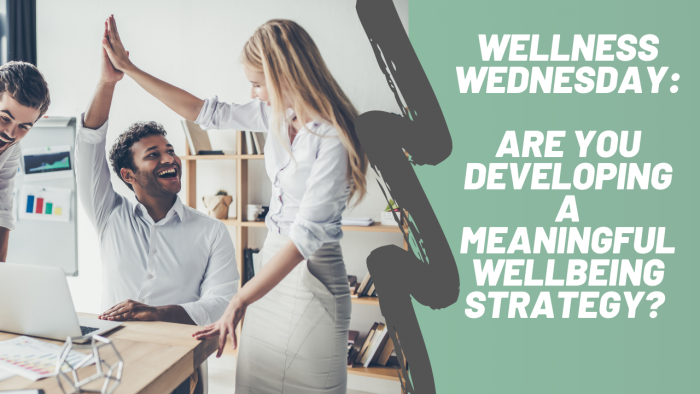Marshall centre writes:
Long before the pandemic, the CIPD highlighted the need for better wellbeing prevision at work to reduce absenteeism caused by workplace stress and improve productivity.
Marshall Centre recently took part in a webinar hosted by Cambridge Network entitled: 'Creating an employee wellbeing strategy - where to start?'
Some good points were raised in the comments during the talk highlighting that it is difficult to implement a meaningful strategy without a large budget and it can be difficult to know where to start, especially if the company culture is “old-school” and not used to recognising wellbeing as an essential business function. Introducing a meaningful wellbeing strategy should not be thought of as just a moral obligation but rather central to the bottom line. Billions of Pounds are lost every year due to long term absenteeism, high attrition rates and poor productivity. So, it is time for business leaders to start taking notice as we recover from the greatest economic shock in 300 years.
Marshall Centre’s Head of Wellbeing, Jo Boyd, recognised the importance of introducing a meaningful wellbeing strategy to ensure the team feel fully supported and are happy, fulfilled and engaged at work.
Here are a few cost-effective ideas that we have implemented at Marshall Centre as part of our wellbeing strategy.
1. Fun Virtual Challenges
Working remotely can be lonely and difficult, especially if members of your team are extrovert and gain energy from being around others. During the summer months, we created Lockdown Olympics and challenged teams to get competitive and complete challenges at home in virtual teams. Some of the challenges were related to fitness and others to hobbies, but everyone was encouraged to share photographs and progress WhatsApp group chat, which helped us feel connected.
The Marshall Group also invited a company to deliver a virtual escape room experience. People from all over the Marshall Group joined including some of our colleagues from Canada. We were put into random teams and challenged to solve a series of clues to be released. This was great fun and a good way to get to know people from different parts of the business.
Virtual pub quizzes have also been a fun distraction for the team. Win or lose, just having a regular get together to talk about something other than work, is a great, free stress reliever.
2. Lunch and Learn (HiveMind)
Studies have shown that learning new skills or gaining knowledge leads to a greater sense of purpose and achievement. Many assume that investing in a regular programme of staff-wide learning is very expensive, however it doesn’t have to cost more than a bit of time. Everyone in your business has a wealth of knowledge and experience to share - from entry level graduates to the CEO everyone has something to share. At Marshall Centre, we introduced a weekly Lunch and Learn session that we call HiveMind. We called it HiveMind because anyone inside or outside of the business can join us for free or lead a session. Each session lasts between 30 – 60 min and the sessions can be about anything and everything, there is no agenda to sell anything or promote a specific product, it is purely about taking some time out of a busy week to engage in some interdisciplinary learning. Not only is interdisciplinary learning good for our wellbeing but it also enables greater creativity. By challenging our brains to learn or think about something new every week (even for an hour) we create stronger connections and new pathways between neurons in the brain, therefore supercharging creativity.
To join the HiveMind mailing list click here
3. Mental Health First Aid
Marshall Centre is proud to say that 100% of all line managers are now qualified as Mental Health First Aiders.
It is a training course that equips people with the tools to identify, understand and support someone who may be experiencing a mental health issue.
"The course was very well delivered by Jo Boyd, who has a wonderful way of making everyone feel safe enough to share their experiences while learning how to support others. I strongly believe that by investing in training for your managers and creating a safe space to be open about how your people are feeling emotionally and physically, you remove the stigma associated with mental ill health and (hopefully) stop a few bad days from snowballing into a crisis." - Janine Hornsby MBA, Marketing Manager
MHFA teaches people how to listen without judgment, reassure someone with concerns and respond in a crisis by sign posting further support. Your people will learn to recognise warning signs of mental ill health and develop the skills and confidence to approach and support someone while keeping themselves safe.
4. Flexible Working Hours
Working remotely has taught us all that businesses can function with flexible working arrangements. Parents have juggled working remotely with home schooling, people have realised that it is okay to take a walk in the afternoon to clear their head, or do a virtual meeting on a stationary bike; we do not have to be slaves to a clock or a dest to get the job done or to get the most out of people. Many businesses have found that their people are far more productive without the distractions caused by a busy, open office. This is one positive change that we predict will remain post COVID.
Want to chat to Jo Boyd about delivering a meaningful wellbeing strategy?
